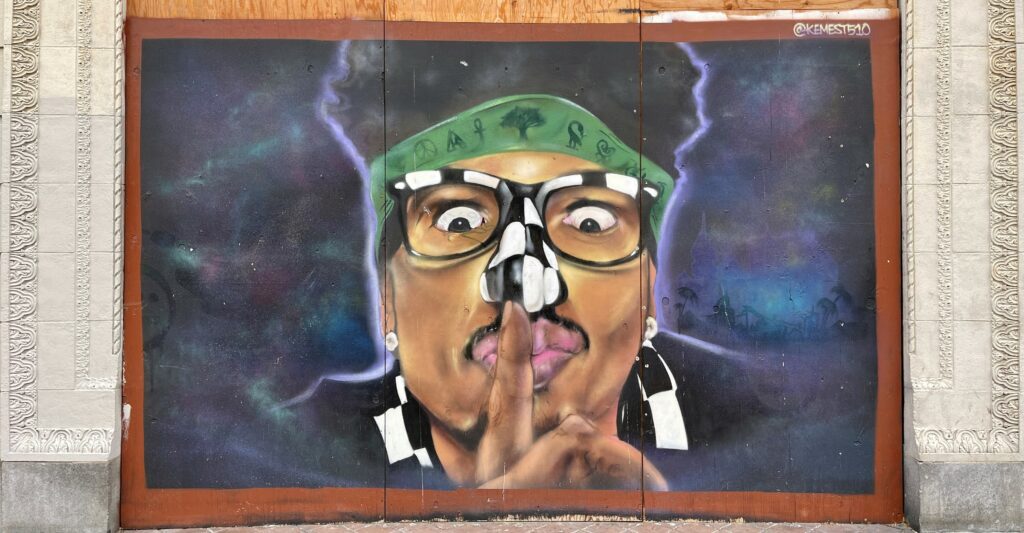Fund applications are now closed and will reopen in Spring or Summer 2026.

Without new visions, we don’t know what to build, only what to knock down. We not only end up confused, rudderless, and cynical, but we forget that making a revolution is not a series of clever maneuvers and tactics, but a process that can and must transform us.
–Robin D.G. Kelley, Freedom Dreams: The Black Radical Imagination
Sparking Radical Hope For A Racially Just Oakland
Click on a hyperlinked term for its definition on the Glossary page.
How might we create a truly racially just and equitable Oakland where everyone belongs?
What policies and practices are needed to make this a reality?

For answers to these thought-provoking questions, we turn to community-rooted BIPOC (Black/Indigenous/People of Color) visionaries, artists, activists, cultural workers and resilient culture keepers to help us create barrier-breaking narrative frames, policy ideas, and practices; to recover old wisdoms to illuminate future paths; and to liberate our imaginations and realize untapped potential.
Belonging in Oakland: A Just City Cultural Fund (the Fund) is a unique public-private partnership inspired by the values lifted up in the City of Oakland’s cultural plan, Belonging in Oakland and a vision to create a more just city. The partnership brings together the cultural equity vision of Oakland’s Cultural Affairs Division, the racial justice mission of the Akonadi Foundation, and the commitment to power building of East Bay Community Foundation (EBCF).
Belonging in Oakland: A Just City Cultural Fund is made possible with major funding from the Surdna Foundation’s Thriving Cultures program and additional funding from the Akonadi Foundation and East Bay Community Foundation. Radical Imagination for Racial Justice is Surdna’s national regranting initiative to enable BIPOC artists in partnership with communities to reimagine policies and practices that will advance justice for those most impacted by systemic racism.
The democratic charge to support an ethically just, aesthetically diverse, dynamic, and rich city asks that we serve the civic narrative of belonging in all its beauty, temperaments, and complexities.
–Roberto Bedoya, Cultural Affairs Manager, City of Oakland
About the Fund
Belonging in Oakland: A Just City Cultural Fund (the Fund) is committed to providing three-year grants to Oakland-based, BIPOC-led collaborations between cultural and social change organizations. Eligible organizations must either have nonprofit status or be fiscally sponsored by a nonprofit. They should also have a proven record of shaping racial and social justice-oriented policies or practices in sectors such as community development, economic justice, educational equity, environmental justice, sustainability, climate change, food justice, health & well-being, and housing rights, immigrant & refugee rights, land use & spatial justice, participation in the civic realm, public safety, and workers’ rights. The Fund seeks such organizations to form or continue collaborations with civically-engaged, Oakland BIPOC artists/cultural practitioners who are deeply rooted in communities that have borne the brunt of systemic racism and social and economic inequality.
In the 2023-2026 funding round, the Fund will support collaborations working together with communities to radically imagine how to transform power relations through a culturally-informed policy lens. Collaborations may seek to redefine the framing of a problem or solution, engage in cross-sector partnerships, reclaim traditional ways, invigorate community assets, or explore other promising approaches to achieving racial justice.
The Fund will award no more than three community-centered collaborations with grants of $100,000 per year for three years, in addition to a $12,000 stipend each year toward life sustaining expenses of the artists/cultural practitioners (for example, to pay down student debt, healthcare or childcare expenses, etc.) and a stipend of up to $25,000 for project-related research/documentation. The program also includes networking and peer learning support for awardees.
Being based and rooted in Oakland is an important concept for the Fund. We are looking for collaborations that are deeply rooted in Oakland communities and have the commitment and capacity to work with community members to address an opportunity or challenge. A community may be geographically, ethnically, or culturally defined. It may also be a community of identity based on, for example, age, faith, sexual orientation, gender identity, or immigration status.
Funded collaborations are expected to produce a policy change-oriented prototype or example that can be shared as a demonstration project to inspire others locally, regionally, or nationally. We want to be respectful of applicant’s time, so we encourage you to read the guidelines below carefully to make sure your policy change-oriented collaboration aligns with the Fund’s intent and expectations.
What We Will Fund
Beyond critiques of injustice, the Fund seeks visionary collaborations with the purposes of:
- Generating radical imaginings that counter oppressive racialized policies with transformative approaches and/or practices for building a more just and equitable city;
- Supporting self-determined and deeply culturally-informed action by those most impacted by systemic racism; and
- Lifting up lifeways and value systems that cultivate greater belonging in Oakland.
The Fund seeks creative, mutually-beneficial, and equitable collaborations working to build pathways to a more just Oakland. Oakland’s BIPOC, civic-facing cultural workers and artists must be critical partners in funded collaborations to help break down old racialized tropes and envision and test new narratives, social agreements, structures, and systems that lay the groundwork for freedom and liberation for Oakland communities.
There is no funding match requirement for this grant.
What end result do we want to see?
The Fund aims to resource and bring to life radical ideas that reimagine how we operate and move as a society — ideas that will be developed, tested, and documented by and with community over a three-year period. From narrative shifts to policy prototypes to new community power-building structures, the Fund seeks to expand the realm of what is possible to achieve racial justice. The arts and cultures of BIPOC communities must inform and be deeply infused in the methods of each collaboration. At the end of the grant period, we expect each collaboration to produce a civic-facing, social change-oriented model or framework that can be shared to inspire others locally, regionally, and nationally.
The question and challenge that the Fund presents to Oakland’s cultural and social justice workers is:
- What visionary narrative, structures, or systems do you want to advance to make Oakland more equitable and just for all its residents?
An important outcome of this program is that learnings and results can be shared with the communities centered in the collaboration as well as with the field for the purpose of enriching the racial or social justice policy landscape. The Fund will require collaborative partners to document and share appropriate learnings and results with the Fund, its awardees, program partners, and other interested parties. The Fund recognizes and honors the importance of preserving ritual and ceremonial spaces intended for limited participation as part of a collaboration’s activities, confidential community research, or preliminary findings not ready for wider distribution.
What We Will Not Fund
The Fund values and recognizes the many roles artistic and cultural work play to create a healthy and just community. However, this program, because of legal requirements and limited resources, will not fund collaborations with an aim to:
- Influence the outcome of elections for candidates for public office
- Support capital campaigns for building maintenance, construction, or purchase, or endowments
- Create artistic works with the principal purpose of putting them before an audience
- Support training activities with the sole purpose of helping individuals develop artistic skills
Program Supports
Grant Amounts
Three-year grants of $100,000 per year will be awarded to three collaborative partnerships.
In addition, each partnership will also receive:
- An annual stipend of $12,000 (12% of the grant amount) for life sustaining expenses of the participating artist(s) or cultural practitioner(s)—for example, to cover healthcare, childcare, student debt, restorative time or activities, or other such expenses—as a modest recognition of the hidden costs of maintaining cultural practices in Oakland’s communities of color.
- An annual stipend of up to $25,000 will be available for the purpose of documenting the learning and outcomes resulting from the collaboration–particularly with regard to new narrative changes, policy arguments or frameworks, or community structures to share with the field. The amount of the documentation stipend will be negotiated with each collaboration based on the scope of their plans and their capacity or desire to carry them out. The Fund will be able to assist with documentation should the collaboration not be able/willing to take that on.
To be awarded a grant, the lead applicant of the collaboration must be prepared to submit a Memorandum of Understanding (MOU) that outlines the respective roles, responsibilities, and general budget allocations of the collaborative partners (including the fiscal sponsor, if applicable); a documentation plan and budget, if you are requesting a stipend for documentation; and a mutually agreed upon plan with the Fund on reporting requirements.
Annual grant renewals will be contingent on demonstrated progress on goals and adherence to funding requirements.
Awardees are requested to notify the Fund of any public activity that is a part of their collaboration so that a Fund representative may attend.
Peer Networking & Learning
The Fund will convene funded collaborations at the beginning of the grant period so that awardees can learn about each other’s plans and determine with the Fund what kind of peer learning they would like to participate in together with the Fund’s support. There may also be opportunities for ongoing networking among awardees and capacity building in cultural strategy.
Reporting Requirements
Near the close of each year of the grant period, the collaborations will be asked to report on their progress on reaching their shared goals and what they have been learning with and about their communities. The form of reporting will be based on the nature of each collaboration and what the Fund needs to track for the program as a whole. Annual reporting requirements will be negotiated between awardees and the Fund before awards are made to ensure mutual benefit and possibilities for sharing learning with other awardees and the field. Some demographic data collection and reporting will be required on an annual basis. Additionally, information about how grant funds and special stipends were allocated will be required so that the Fund can report this information back to the Surdna Foundation. Annual grant renewals will be contingent on demonstrated progress toward goals and adherence to funding requirements.
